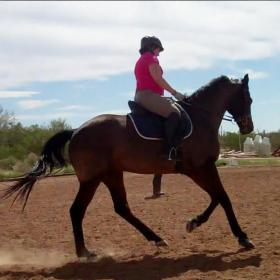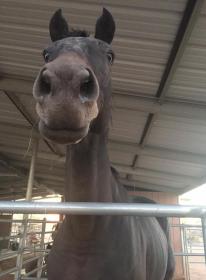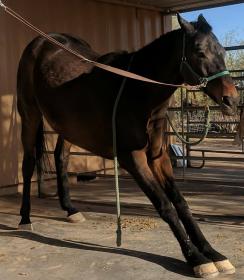How did you decide when to retire a horse? Please share the signs it was time you saw (traumatic injuries are fine, too, just won’t help me in my specific circumstances.)
Horse is my OTTB. He’s not that old (16), but he has always played VERY athletically, and has beaten up his body repeatedly with his acrobatics - wipeouts, crashes, etc.
He is the love of my horsey life - call him a heart horse or not, we connected in a way I have never connected with another horse. When I’m on the property, his eyes follow me and I get whinnies each time I am within sight. He walks away from his grain or hay to come to me for attention. I don’t show him, and have no goals for his performance future. He is only in training to ensure he continues to get regular work until his body says it’s time to retire.
Last year I started noticing topline changes, and have worked with a vet to get him the healthiest feeds to keep weight without encouraging him to injure himself playing hard again. He has really reduced the amount of his play time in the last two years, but still does play a lot more than most horses I know. Where he used to take joy in the extensions and lateral work, pirouettes, etc., he has shown less desire to work as hard, and we have reduced his workload based on his attitude about work - never pushing him. He also regularly stretches himself more (see downward facing horse photo), and really as expected for a 16 year old just isn’t as physically loose at the start of a ride as he used to be - even while mentally he starts out without the tension he used to hold.
In the last 6 weeks he has been sore in different ways 3 times. No tendon/ligament type injuries, and nothing which should be a long lingering problem. However, it just seems as if he is reaching a point where he has the aches and pains of age, arrived early because of his enthusiasm when he plays and lack of bounce back ability in his body compared to when he was younger.
I question if the easy work focusing on keeping him supple in his body and relaxed through his back is still helping anymore, as yesterday’s lameness was overall muscle soreness (and he appears to have hit a tree sideways, probably spinning and playing with another horse, but topline muscles being the main location of discomfort.) First we go to bodywork for the current problem and see how it resolves - I assume it will help right away and he’ll be back in work shortly.
Anyway, we’re getting to the point I need to start paying attention to what the right time to retire him is. With no goals for him but his happiness and comfort, that means figuring out how to balance if physically he should still be in work or not vs his mental happiness. Last time he was out of work was 6 months while I recovered from an injury, and he developed an ulcer despite free feed hay and 100% turnout with buddies.
When he retires, he’ll come home, and we will both enjoy that. He watches my bedroom window in the morning, and we have chats together every morning and night, the barn was built for his preferences with a stall attached to a 1 acre run so he can stay inside or go out at leisure, even a nice flat area he likes to nap next to his friends (equine and canine.) I don’t want him to age, I want him to stay my ridiculous, goofy boy… but I want him happy and comfortable most of all.
[ATTACH=JSON]{“data-align”:“none”,“data-size”:“full”,“data-attachmentid”:10187870}[/ATTACH]
[ATTACH=JSON]{“data-align”:“none”,“data-size”:“full”,“data-attachmentid”:10187871}[/ATTACH]
[ATTACH=JSON]{“data-align”:“none”,“data-size”:“full”,“data-attachmentid”:10187872}[/ATTACH]




